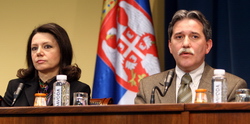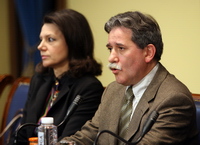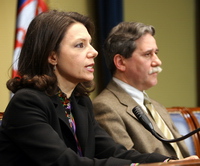Q:
A:
Arrival of UNSC mission – step one in assessment of actual situation in Kosovo
Belgrade,
25 April 2007
Coordinator of the state negotiating team for Kosovo-Metohija Slobodan Samardzic stated today that Serbia gladly accepts and awaits the arrival of the UN Security Council mission, whose aim is to determine the factual state in Kosovo-Metohija, as well as the way and extent to which Resolution 1244 was implemented.
Samardzic told a press conference that the Serbian side believes that the mission, which is to remain in Belgrade tomorrow and spend the day after and Saturday in Kosovo, should talk less with representatives of institutions, parties and international organisations and more with people in the field whose rights are being directly breached.
He voiced conviction that the mission will practically begin the unblocking of the Kosovo status resolution process, adding that its aim is to begin a new stage which may continue with a negotiating process, in order to reach a compromise solution.
Samardzic said he does not expect the Security Council delegation to comprise a final report after the visit.
He also pointed out that he will suggest that after the mission’s visit another, lower-ranking delegation also comes to the province and more thoroughly explore the status in the province.
He recalled that the proposal to form a UN security Council mission, which Serbia gladly accepted, came from Russian Ambassador to the Council a month ago.
UNMIK representatives have been submitting biannual reports on the status in the province for years, however these reports do not present the actual state of affairs, he said and pointed out that ever since the UN mission arrived in Kosovo-Metohija, a genuine ethnic cleansing was carried out there and approximately two-thirds of the Serbian and other non-ethnic Albanian population were exiled.
He voiced conviction that the mission will practically begin the unblocking of the Kosovo status resolution process, adding that its aim is to begin a new stage which may continue with a negotiating process, in order to reach a compromise solution.
Samardzic said he does not expect the Security Council delegation to comprise a final report after the visit.
He also pointed out that he will suggest that after the mission’s visit another, lower-ranking delegation also comes to the province and more thoroughly explore the status in the province.
He recalled that the proposal to form a UN security Council mission, which Serbia gladly accepted, came from Russian Ambassador to the Council a month ago.
UNMIK representatives have been submitting biannual reports on the status in the province for years, however these reports do not present the actual state of affairs, he said and pointed out that ever since the UN mission arrived in Kosovo-Metohija, a genuine ethnic cleansing was carried out there and approximately two-thirds of the Serbian and other non-ethnic Albanian population were exiled.
Samardzic specified that the actual number is 250,000 people, whereas only few percent have returned to their homes, although official UNMIK reports speak of a larger percentage.
Freedom of movement is restricted for Serbs in Kosovo, the safety situation is disastrous and 156 Orthodox Churches have been burned to the ground, while these facts are being covered up with optimistic tales about improving and implementation of standards, said Samardzic.
Now that the negotiation is finished and it is clear to the Security Council that a resolution supplanting Resolution 1244 cannot be made, it has been concluded that it is necessary to re-examine the state and fulfillment of standards and the above-mentioned Resolution.
Another question arises, and that is why introduce a new resolution if the previous one has not been fulfilled in its main provisions such as stabilisation in the province, return of the exiled, respect of human rights, asked Samardzic.
President of the Coordinating Centre for Kosovo-Metohija Sanda Raskovic-Ivic said that the Security Council mission will stay in Serbia for only a short while, adding that Serbia is not satisfied with the fact that the mission will not have the time to visit any of the 156 devastated churches, or Prizren and Gorazdevac. However she said it is good that the mission will visit Orahovac and see how the Serb community lives there.
It will also visit the community of returnees in Brestovik, a place that does not reflect the actual image of the Serbs’ mood, said Raskovic-Ivic and added that Belgrade will suggest that the mission visits some other returnee communities.
On Friday the mission will visit Bishop Artemije in Gracanica and we would like them to visit the collective centre there, that is, the container residence area where people afflicted by the March 17-18 pogrom now live, said Raskovic-Ivic.
Freedom of movement is restricted for Serbs in Kosovo, the safety situation is disastrous and 156 Orthodox Churches have been burned to the ground, while these facts are being covered up with optimistic tales about improving and implementation of standards, said Samardzic.
Now that the negotiation is finished and it is clear to the Security Council that a resolution supplanting Resolution 1244 cannot be made, it has been concluded that it is necessary to re-examine the state and fulfillment of standards and the above-mentioned Resolution.
Another question arises, and that is why introduce a new resolution if the previous one has not been fulfilled in its main provisions such as stabilisation in the province, return of the exiled, respect of human rights, asked Samardzic.
President of the Coordinating Centre for Kosovo-Metohija Sanda Raskovic-Ivic said that the Security Council mission will stay in Serbia for only a short while, adding that Serbia is not satisfied with the fact that the mission will not have the time to visit any of the 156 devastated churches, or Prizren and Gorazdevac. However she said it is good that the mission will visit Orahovac and see how the Serb community lives there.
It will also visit the community of returnees in Brestovik, a place that does not reflect the actual image of the Serbs’ mood, said Raskovic-Ivic and added that Belgrade will suggest that the mission visits some other returnee communities.
On Friday the mission will visit Bishop Artemije in Gracanica and we would like them to visit the collective centre there, that is, the container residence area where people afflicted by the March 17-18 pogrom now live, said Raskovic-Ivic.
She welcomed the fact that the mission will visit the northern part of Kosovo-Metohija and talk with both Serbs and ethnic Albanians in Kosovska Mitrovica, as well as visit the village of Svinjare to see for itself why no Serbs have returned there.
We will do our best and offer the mission a visit to the Rudnica border crossing where internally displaced people will gather to show they wish to return to their homes.
According to Raskovic-Ivic, the return of the displaced is the key standard that has not been fulfilled, whereas it is very important to show that Serbs do want to go back.
Raskovic-Ivic stressed that she will acquaint the mission members with the fact that UNMIK representatives regularly visit Serb communities and exert inappropriate pressure with promises and mild threats in order to scare people into supporting the UNMIK and Ahtisaari’s proposal.
We will do our best and offer the mission a visit to the Rudnica border crossing where internally displaced people will gather to show they wish to return to their homes.
According to Raskovic-Ivic, the return of the displaced is the key standard that has not been fulfilled, whereas it is very important to show that Serbs do want to go back.
Raskovic-Ivic stressed that she will acquaint the mission members with the fact that UNMIK representatives regularly visit Serb communities and exert inappropriate pressure with promises and mild threats in order to scare people into supporting the UNMIK and Ahtisaari’s proposal.














